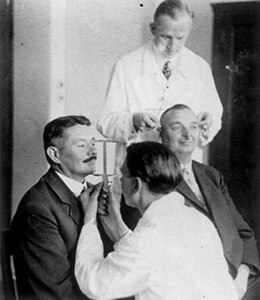
Back Otmar von Verschuer German Otmar von Verschuer Spanish Otmar von Verschuer Finnish Otmar von Verschuer French אוטמר פרייהר פון פרשוהר HE Otmar Freiherr von Verschuer Italian オトマー・フライヘル・フォン・フェアシューアー Japanese Otmar von Verschuer Dutch Otmar Freiherr von Verschuer NB Otmar Freiherr von Verschuer Polish
Otmar Freiherr von Verschuer | |
|---|---|
 Otmar von Verschuer (rear) supervises the measurement of two men's heads as part of an anthropometric study of heredity. | |
| Born | 16 July 1896 |
| Died | 8 August 1969 (aged 73) |
| Scientific career | |
| Fields | Human biology, human genetics |
| Institutions | Kaiser Wilhelm Institute of Anthropology, Human Heredity, and Eugenics, University of Münster |
Otmar Freiherr von Verschuer (16 July 1896 – 8 August 1969) was a German-Dutch human biologist and geneticist, who was the Professor of Human Genetics at the University of Münster until he retired in 1965. A member of the Dutch noble Verschuer family, his title Freiherr is often translated as baron.
He was regarded as a pioneer in the twin methodology of genetics research and in the study of the inheritance of diseases and anomalies.[1] A Nazi-affiliated eugenicist with an interest in racial hygiene, he was an advocate of compulsory sterilization programs in the first half of the 20th century.[2][3] Among his many students was Josef Mengele, a war criminal who directed experiments on children at Auschwitz.
He successfully redefined himself as a geneticist in the postwar era. During the 1950s and 1960s, he was known for research on the effects of nuclear radiation on humans and for his warnings against the possibility of creating "scientifically improved" human beings offered by genetic science.
Verschuer was the director of the Institute for Genetic Biology and Racial Hygiene from 1935 to 1942 and director of the Kaiser Wilhelm Institute of Anthropology, Human Heredity, and Eugenics (KWI-A) from 1942 to 1948. From 1951 to 1965, he was Professor of Human Genetics at the University of Münster, where he also served as Dean of the Faculty of Medicine. At Münster, he established one of the largest centers of genetics research in West Germany, and remained one of the world's most prominent genetics researchers until his death. He became Professor Emeritus in 1965; he received numerous memberships in learned societies. In 1952 he was elected President of the German Anthropological Association. His son Helmut von Verschuer was a high-ranking official of the European Commission.
| This article is part of a series on |
| Eugenics |
|---|
- ^ Björn M. Felder, Paul J. Weindling, Baltic Eugenics: Bio-Politics, Race and Nation in Interwar Estonia, p. 310
- ^ Nicholas Wade, "IQ and Heredity: Suspicion of Fraud Beclouds Classic Experiment", Science 26 November 1976: 916–919.
- ^ D. D. Dorfman, "The Cyril Burt Question: New Findings", Science 29 September 1978: Vol. 201 no. 4362 pp. 1177–1186